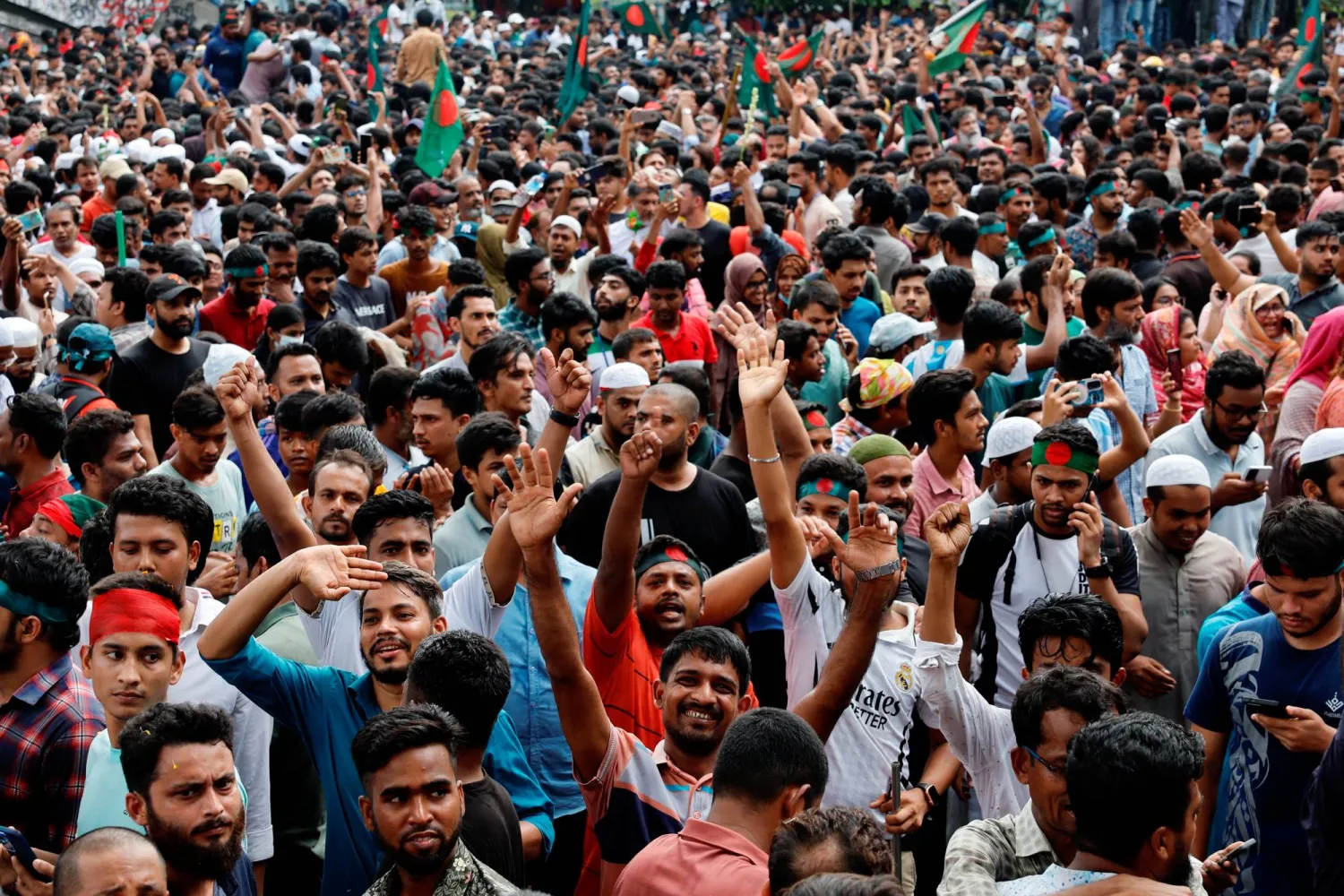Bangladesh’s president dissolved parliament Tuesday, clearing the way for new elections to replace the longtime prime minister who resigned and fled the country following weeks of demonstrations against her rule that descended into violent unrest.
President Mohammed Shahabuddin also ordered opposition leader Khaleda Zia released from house arrest. Zia, a longtime rival of ousted Prime Minister Sheikh Hasina, was convicted on corruption charges by Hasina's government in 2018.
The streets of Dhaka appeared calmer Tuesday, with no reports of new violence as jubilant protesters thronged the ousted leader’s residence. Some posed for selfies with soldiers guarding the building where a day earlier angry protesters had looted furniture, paintings, flower pots and chickens.
As the country waited for a new government to emerge, a key student leader said protesters wanted Nobel Peace Prize laureate Muhammad Yunus to head an interim government.
Yunus, who is currently in Paris for the Olympics, called Hasina’s resignation the country’s “second liberation day.” He could not immediately be reached for comment, but student leader Nahid Islam said Yunus had agreed.
Bangladesh’s figurehead president and its top military commander said late Monday that an interim government would be formed soon to preside over new elections.
Hasina fled to India by helicopter on Monday as protesters defied military curfew orders to march on the capital, with thousands of demonstrators eventually storming her official residence and other buildings associated with her party and family. Protests against a quota system for government jobs that critics said favored people with connections to her party grew into broader challenge to her 15-year rule in recent weeks.
A crackdown on the demonstrations led to clashes that left scores dead — and only fueled the movement.
Military chief Gen. Waker-uz-Zamam said he was taking temporary control of the country after Hasina resigned, and he and the country’s figurehead president promised an interim government would be formed soon to preside over new elections. The military wields significant political influence in Bangladesh, which has faced more than 20 coups or coup attempts since independence in 1971.
Earlier Tuesday, protest leader Sarjis Alam told reporters that they had asked the president to dissolve Parliament by 3:00 p.m., and threatened to renew demonstrations otherwise as they seek to “repair the state.”
“We have proposed the name of Muhammad Yunus with his consent, now if someone else comes from among the MPs, we will not allow that to happen,” he said.
A longtime opponent of the ousted leader, Yunus was accused of corruption by her government and tried on charges he said were motivated by vengance. He received the Nobel in 2006 for work pioneering microlending.
Islam, the organizer, said protesters would propose more names for the cabinet, and suggested that it would be difficult for those in power to ignore their wishes.
Amid celebrations, student Juairia Karim said it was a historic day: “Today we are getting what we deserve,” she said. “Everyone is happy, everyone is cheerful.”
But the country was still counting the toll of weeks of violent unrest that produced some of the country’s worst bloodshed since the 1971 war of independence. Many fear that Hasina's departure could lead to even more instability in the densely populated South Asian nation, which is already dealing with crises from high unemployment to corruption to climate change.
Violence just before and after Hasina's resignation left at least 109 people dead, including 14 police officers, and hundreds of others injured, according to media reports, which could not be independently confirmed.
Amid security concerns, the main airport in Dhaka, the capital, suspended operations for eight hours.
In the southwestern district of Satkhira, 596 prisoners and detainees escaped from a jail after an attack on the facility Monday evening, the United News of Bangladesh agency reported, as police stations and security officials were attacked across the country.
Police in Dhaka mostly left their stations and assembled in a central barracks in fear of attacks after several stations were torched or vandalized.
The main opposition Bangladesh Nationalist Party Tuesday urged people to exercise restraint in what it said was a “transitional moment on our democratic path.”
“It would defeat the spirit of the revolution that toppled the illegitimate and autocratic regime of Sheikh Hasina if people decide to take the law into their own hands without due process,” Tarique Rahman, the party's acting chairman, wrote on the social media platform X.
In a statement Monday, the United Nation’s human rights chief, Volker Türk, said the transition of power in Bangladesh must be “in line with the country’s international obligations” and “inclusive and open to the meaningful participation of all Bangladeshis.”
Hasina landed at a military airfield near New Delhi on Monday after leaving Dhaka and met India’s National Security Adviser Ajit Doval, the Indian Express newspaper reported. The report said Hasina was taken to a safe house and is likely to travel to the United Kingdom.
The 76-year-old was elected for a fourth consecutive term in a January vote that was boycotted by her main opponents. Thousands of opposition members were jailed before the polls, and the US and the UK denounced the result as not credible, though the government defended it.
India’s external affairs minister confirmed her presence in the country, but did not indicate whether she intends to stay.
External Affairs Minister S. Jaishankar told parliament that Hasina "at very short notice she requested approval to come for the moment to India.”
Bangladesh’s President Dissolves Parliament, Clearing the Way for Elections to Replace Ousted Leader

People celebrate the resignation of Prime Minister Sheikh Hasina in Dhaka, Bangladesh, August 5, 2024. REUTERS/Mohammad Ponir Hossain

Bangladesh’s President Dissolves Parliament, Clearing the Way for Elections to Replace Ousted Leader

People celebrate the resignation of Prime Minister Sheikh Hasina in Dhaka, Bangladesh, August 5, 2024. REUTERS/Mohammad Ponir Hossain
لم تشترك بعد
انشئ حساباً خاصاً بك لتحصل على أخبار مخصصة لك ولتتمتع بخاصية حفظ المقالات وتتلقى نشراتنا البريدية المتنوعة







